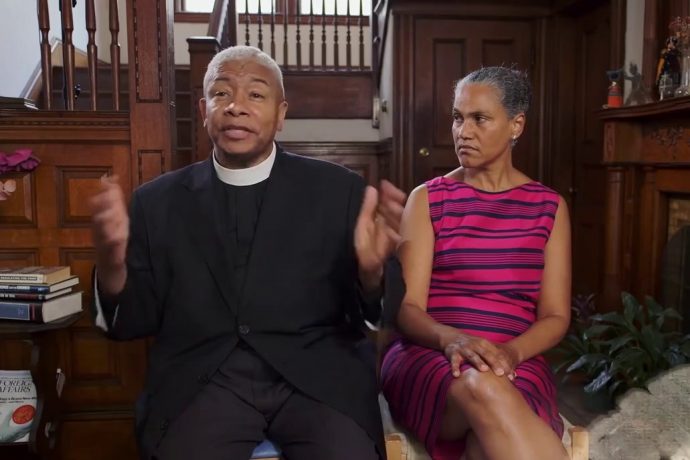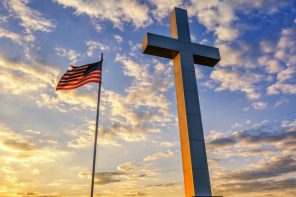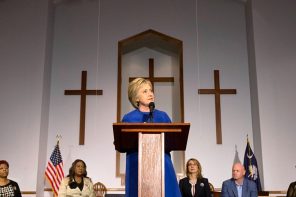An open letter from 25 black clergy illustrating “black church concerns” has been making the rounds on multiple news outlets and is being lauded for taking “Hillary to task” for supposedly not acknowledging the needs of the African American community. The coverage has veered towards “exposing” how Hillary Clinton hasn’t been taking her black voter base seriously, but few sites managed to properly contextualize the letter’s blatant hostility toward both black women and the LGBT community.
The letter capitalized on the negative press Clinton has been receiving for what’s been perceived as a tepid response to social justice movements like Black Lives Matter and her questionable claims to carry “hot sauce in my bag.”
It starts out okay enough, pointing out how both Republican and Democratic parties have been apathetic to the plight of black Americans.
Today in the United States more than ten million people of African descent face a crisis of catastrophic proportions. Life in our major post-industrial centers can be poor, nasty, brutish and short. When it comes to the black underclass America’s two major political parties appear to have achieved a rare unity in their record of bipartisan indifference. It is for this reason we, clergy and intellectuals who serve the poor, Democrats and independents, appeal to you.
Alright, alright, sounds pretty on the level so far.
The letter then moves to its first bullet point, addressing the lack of education and employment opportunities for black men. Young black men do face a higher unemployment rate when compared to black women and white men, and the letter’s demand that Clinton move beyond making appearances at black churches into actually creating a black policy agenda is fair.
Then the letter takes a hard right turn and starts tumbling precipitously downhill. It becomes obvious that expressed concerns about poverty and violence are just a vehicle for the group’s true aims: taking away rights from groups differently marginalized from themselves.
The clergy who have signed on to the letter criticize Clinton for comments she made in a 2015 speech concerning the right of women everywhere to “reproductive healthcare and safe childbirth.” According to these clergy, such a right violates their religious freedom and is “reminiscent of totalitarianism.” They continue to further demonize black women and their bodily autonomy by saying “more black babies are dying in their mothers’ wombs than are being born.”
Of the all the issues the black community faces, this group’s biggest worry is stopping young black women from determining their reproductive fate? Something doesn’t add up.
The letter is correct that black women make up a disproportionate percentage of those who seek abortion care when compared to other races. However, that’s due to a lot of socioeconomic factors that mostly stem from poverty. If this group were truly interested in curtailing abortion rates, that entire section should have been about access to contraception, sex education and family planning services. But they didn’t seem to have space to mention that anywhere.
The obsession these patriarchal groups have with black women’s bodies has little to do with life. Controlling the means of (re)production among black women has long been a concern for black male-led groups (going all the way back to the Black Panthers who felt it was black women’s responsibility to produce more “warriors” for the movement).
The group takes it even one giant step further by co-opting the Black Lives Matter movement to promote their anti-choice agenda. The section ends by imploring “Don’t black lives matter?”—basically equating black women who decide to have abortions to law enforcement officers who snuff out black life.
Their viewpoints don’t even align with black popular opinion about reproductive justice. According to Pew, more than half of black Protestants think abortion should be legal, and another survey showed 92 percent of black Americans who attend weekly religious services support publicly funded contraception for those who couldn’t afford it otherwise.
In the next section on state violence, they present police brutality alongside the tired trope of “black on black” crime, creating a false equivalency. (On top of that, they couldn’t even bother to spell all the names of the slain black Americans they list correctly.)
Then, finally, they devote the lengthiest section to religious freedom. The letter reads, “A well-financed war is now being waged by the gay and lesbian community in the US and abroad on the faith of our ancestors.”
What?
They go on to say that it’s insulting to the memory of black civil rights leaders to compare their movement to the one for LGBT rights, and that the black church should be free to “fulfill our call to righteous living”—aka discriminating against LGBT people.
A look at the list of signatories at the bottom shows it’s virtually all black male clergy. Some of them have curious backgrounds, like Bishop James W.E. Dixon who was arrested a few years back on domestic violence charges, or Rev. Jamal “These Hoes Ain’t Loyal” Bryant who likes using his pulpit to police black women’s sexuality despite his own well-publicized dalliances.
Though they all claim to be Democrats or Independents, the signatories sure do have a lot in common with the staunch conservatives who would turn a blind eye to (valid) issues the letter addresses, like poverty and violence. That might be because the missive was spearheaded by the Seymour Institute for Black Church and Policy Studies, which is housed by the ultra-conservative think tank, the Witherspoon Institute.
What’s frustrating about the letter more than the content, which I found unsurprising, is how it’s being misrepresented in media as the legitimate concerns of the black church. It’s demeaning to the countless clergy, scholars and activists who make the black church community so overwhelmingly diverse and nuanced. To present this group of 25 clergy as a microcosm of what black America wants and thinks is lazy and dangerous. It galvanizes other demographics that draw glee from the oppression of women of color and LGBT people.
Throughout the letter, they repeatedly refer to themselves as the black church. Do they speak for black women clergy like Yolanda Pierce or Pamela Lightsey or Faye London? They speak only for themselves, and their need to make black America great again by rolling back abortion rights and the rights of the LGBT community. As we’re on the eve of this historic election, this letter only reminds us that clergy like these represent the vestiges of a black church that is withering away to make room for new traditions, new practices, and new theologies that are both inclusive and uplifting.




